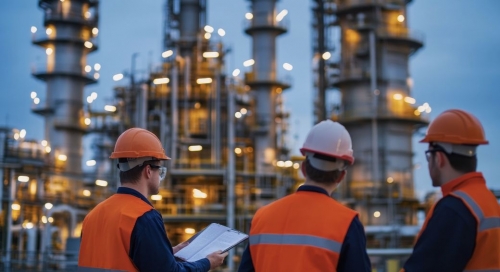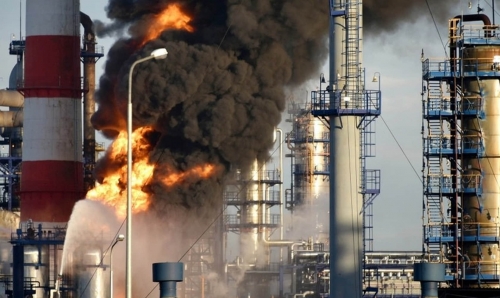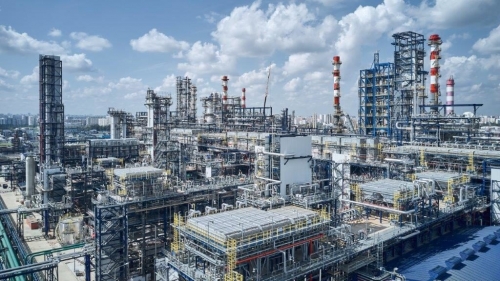Honeywell UOP has been awarded a critical technology and equipment supply contract on Dangote Group’s refinery under development by the industrial conglomerate near Lagos in southern Nigeria.
The 650,000 bpd facility will become by far the continent’s largest upon belated completion, now scheduled by the end of the decade, and will meet the entirety of domestic requirements. At present, this is served predominantly by imports augmented by patchy supplies from the notoriously dysfunctional, state-run local refineries.
Government pledges on taking office two years ago to upgrade the domestic system have thus far yielded little concrete progress. However, a novel idea is being fleshed out to turn the long-standing problem of illegal refining of stolen oil in the Niger Delta into an opportunity to develop much-needed modular refineries under federal auspices.
The industrial group’s Dangote Oil Refinery subsidiary on April 27 signed a contract with the US firm, covering technology licensing, critical equipment supply and designs for the planned refinery at the Lekki Free Trade Zone.
UOP will license residue fluid catalytic cracking (RFCC), continuous catalytic regeneration (CCR), mild hydrocracking and isomerisation technology, and provide associated proprietary equipment. This includes catalyst regeneration and dryer regeneration control systems, high-performance column trays and heat exchanger tubes.
Other equipment supplied will include a modular CCR unit, catalyst coolers, a third-stage separator system for the RFCC unit and two pressure swing adsorption units to purify hydrogen.
The latest agreement builds on an original contract between the same companies covering the technology supply signed in May 2015 – shortly after Dangote had expanded the proposed scope from 500,000 bpd, itself an increase from original plans for a 400,000 bpd facility.
Estimated project costs have been commensurately raised to stand at US$12 billion. At the capacity now envisaged, the plant will be the largest single-train refinery in the world.
Unsurprisingly in light of the scheme’s size and novelty – coupled with the renowned challenges of doing business in Nigeria – the project has moved more slowly than anticipated when launched at the turn of the decade. At the time of securing a landmark US$3.3 billion project financing in 2013 from a group of 12 international and local banks, completion was scheduled for last year.
In December, group chairman and owner Aliko Dangote projected mechanical completion in late 2018 and commissioning the following year. The main process units will include the crude distillation unit, an RFCC unit – the world’s largest – a diesel hydro-treating unit, a CCR unit, an alkylation unit and a polypropylene unit, producing chiefly Euro V-quality gasoline and diesel and international-standard jet fuel.
Engineers India was awarded the project management consultancy (PMC) and engineering, procurement and construction management (EPCM) contract in mid-2014. The facility is being integrated with polypropylene and fertiliser plants, the latter – with capacity of around 2.8 million tpy – under construction by Italy’s Saipem.
On completion, the refinery will fully meet domestic demand estimated at around 400,000 bpd – saving Abuja billions of dollars in import costs while assuaging enormous local chagrin that such an oil-rich country should require fuel from abroad.
Nameplate capacity from Nigeria’s four existing state-owned refineries – at Warri and Port Harcourt in the south and at Kaduna in the north-west – stands at 445,000 bpd. However, output has been running at a fraction of such levels for many years and promises by the two-year-old government of President Mohammadu Buhari and his Petroleum Resources Minister Ibe Kachikwu to restore and upgrade the facilities have yet to bear significant fruit.
However, in late March, a novel plan was revealed by the federal authorities to collaborate with operators of illegal refineries in the Niger Delta on the establishment of government-sanctioned modular refineries, with local communities, oilfield operators and Abuja each holding stakes and sharing profits.
This was conceived during the much-applauded temporary leadership in the preceding months of Vice President Yemi Osinbajo.
The proposed facilities would receive crude under federal sanction – the aim being to alleviate the endemic oil theft in Delta and its associated losses to the government and foreign upstream operators while boosting local fuel supply.
Addressing a conference in the capital in late April, Kachikwu confirmed that such discussions were under way with some of the oil-rich region’s refiners and hailed the initiative for potentially providing a legal source of income and employment for Delta residents while improving national productivity.
The theft of oil in the Delta, either for refining or export as crude, is estimated to remove 250,000-400,000 bpd from the country’s official daily production, while pipeline sabotage and resultant feedstock shortages have contributed to the underperformance of the state’s existing refineries – compounding years of underinvestment by owner Nigerian National Petroleum Corp. (NNPC).
UOP signs new Dangote Refinery deal
2017.05.12
1 847

%20(1).png)



